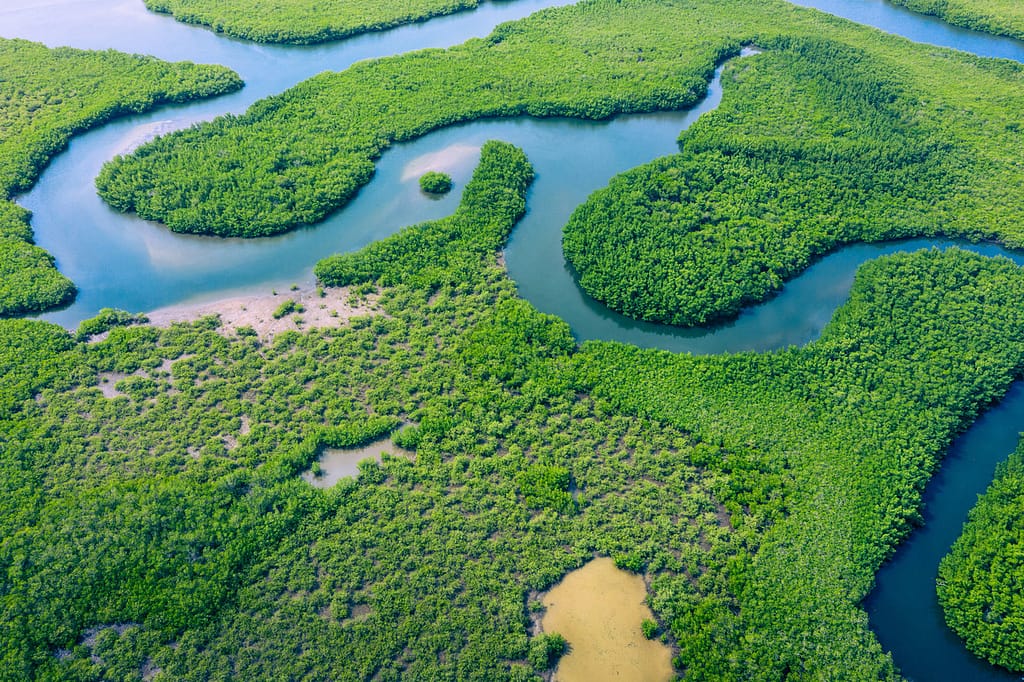It may sound obvious, but we all rely on nature to survive. Nature underpins and sustains all life on Earth, and it provides essential resources and services for countless industries. That’s why it’s crucial to regularly remind ourselves of this fundamental relationship and the crucial role ecosystems play in our daily operations.
Here are five reasons why protecting and restoring nature doesn’t just ensure a thriving planet, but a thriving business as well.

1. You won’t hit your climate targets without restoring nature
Nature loss and climate change are intrinsically linked — a failure in one sphere will cascade into the other. When ecosystems and biodiversity decline, then the climate warms, leading to further biodiversity loss and more climate change. However, as we restore ecosystems and regenerate nature, we see climate change receding. It’s clear the future of climate change is directly linked to the fate of nature.
The momentum created by the 2015 Paris Agreement, and more recently, the Global Biodiversity Framework that came out of COP15 in Montreal, has increased awareness of nature’s role in the climate crisis. As companies set their climate goals, it is crucial that they recognize the interconnectedness of these issues and take a systemic approach to addressing them. Focusing on the climate crisis and the nature crisis separately will not be enough to achieve the necessary changes to mitigate the impacts of both. This means that it is actually a more effective use of time, money, and other resources for businesses to combine their efforts to reduce their greenhouse gas emissions with their work to regenerate nature.
The best time to act on these issues was 50 years ago, but the next best option is to act now. Let’s protect and restore nature, and build a thriving future for our businesses on a thriving planet.

2. Stay ahead of the competition by engaging with nature
The so-called “Paris Agreement for Nature,” the Kunming-Montreal Global Biodiversity Framework, was adopted by nearly 200 countries at the end of 2022. It’s the largest-ever international treaty signed to confront the biodiversity crisis. Since then, support has grown for mandatory reporting on biodiversity. More than 400 companies and financial institutions have called for the closure of loopholes for bad actors and a leveling of the playing field between businesses — effectively making business support of natural capital a key area of competition.
Investors are also rallying around nature in a big way. The Taskforce on Nature-related Financial Disclosures (TNFD) is set to publish its recommendations in September 2023 to harmonize the financial and nature disclosures that businesses must make to receive investment. When combined with the International Finance Corporation’s (IFC) Biodiversity Finance Reference Guide and the new Nature Action 100 Investor Engagement Initiative, a clear picture is emerging: Any business seeking serious investment will need to measure and disclose its impacts on nature and eventually demonstrate improvements to natural capital.
In addition to these incentives, increasingly ambitious and broad regulations are coming into force that will require much more detailed reporting of a company’s impact on nature. In the EU, the Deforestation Directive and the Corporate Sustainability Reporting Directive (CSRD) are causing a veritable revolution in supply chain data collection and reporting, signaling that nature impacts, such as land use change, carbon emissions, pollution, water use, and biodiversity loss, are not only a physical (and moral) reality for your business, but increasingly a financial and legal one.

3. Nature (positive) is the next big business opportunity
The World Economic Forum estimated that the top three sectors that affect nature present a $10.1 trillion business opportunity annually. With an annual investment of $2.7 trillion, the return on investment is a staggering 374%, by far the best investment going, when you also take into account the social and environmental benefits.
For those of us who have been working on conservation and restoration, this is unsurprising. We already know that beyond providing clean air, water, food, and shelter, nature is the basis of all economic activity. Natural capital makes all other forms of capital possible. Investing in nature is, therefore, a strategic decision that provides not only environmental benefits but also significant economic and social returns.
That’s why global companies like PepsiCo are betting on nature and investing heavily in resilient value chains. Further benefits can be derived from the reduction of climate risks such as flooding, droughts, and other extreme weather. Investing in nature has become a lucrative opportunity that businesses cannot afford to miss.

4. Your business may be more dependent on nature than you thought
Six of the top 10 risks in the 2023 Global Risk Index stem from the nature crisis or climate crisis. These numbers are alarming, but not surprising if we consider the rapid environmental degradation of our planet within the context of our dependence on natural resources. Approximately $44 trillion of economic value generation (over half of the world’s GDP) is moderately or highly dependent on ecosystems and their services such as pollination, water quality, and disease control.
How many people, then, are mostly, or entirely dependent on nature for their livelihoods? How many businesses?
Every industry, from banking to healthcare, relies to some extent on what our planet provides. The report “Nature Risk Rising: Why the Crisis Engulfing Nature Matters for Business and the Economy,” from the World Economic Forum, translates the status quo for nature into business consequences in terms of gross value add (GVA) directly or indirectly dependent on ecosystem services.
It’s becoming increasingly clear that businesses depend on nature much more than previously thought. With nature in crisis, we need businesses to recognize their dependence on natural resources and fully embrace their critical role in protecting and restoring nature.

5. Working in harmony with nature will set your business up for long-term success
Focusing narrowly on short-term financial gains over long-term value creation can cause over-exploitation of natural resources and the degradation of the environment. Businesses operating in this way have thus far been able to overlook the long-term risks and liabilities of environmental degradation, such as water shortages, soil erosion, and loss of biodiversity. However, it’s exactly these processes that are increasingly disrupting supply chains and driving up the cost (and risks) of doing business. Put plainly, companies that aren’t considering and accounting for nature are undermining their own business case. Ultimately, protecting ecosystems and biodiversity isn’t a “nice-to-have” — it’s a prerequisite for resilient value chains and resilient business. With that in mind, companies looking to guarantee the stability of their operations should be aware that “there is no future for business as usual.”
Happily, opportunities, allies, and resources abound for companies who want to support nature. By measuring your impact on nature, setting targets, and building regenerative business models, you can ensure that your business is sustainable and generates long-term value for people and the planet. Businesses that prioritize nature will enjoy a competitive advantage and be well-positioned for long-term success.




